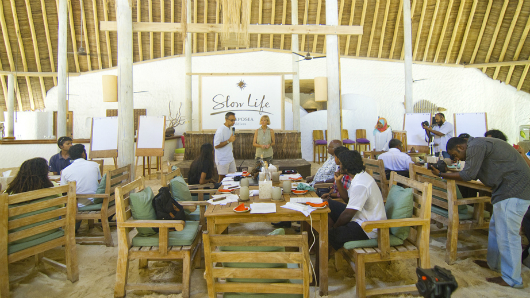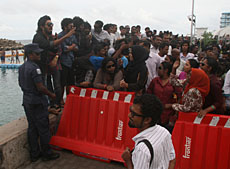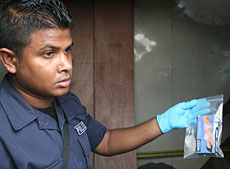“The mass do not take their opinions from dignitaries in Church or State, from ostensible leaders or from books. Their thinking is done for them by men much like themselves, addressing or speaking in their name, on the spur of the moment… ” – John Stuart Mill, On Liberty
As I’m writing this (13th March 2013) negotiations are underway between Male City Council, Environment Ministry and Tatva Global, with the help of Clinton Global Initiative towards a final resolution that will hopefully put Male’s waste management issue behind us. Though it would seem that the issue is simply, writing a fair and favourable contract for all stakeholders involved, the picture that emerges from media is entirely different.
The media narrative (especially in the broadcast media belonging to rich resort owning businessmen) is a simple one. Male City Council with the sole interest of obstructing proper functioning of government had deliberately halted its waste management program. At times, this story shifts towards a negligent or inefficient Male City Council.
Nevertheless, the basic premise is indubitably clear: the responsibility lies with Male City Council. While the waste management crisis is a real, concrete issue that affects many lives, this simplified story of good and evil that we are sold supports a political goal – that of constructing a people antagonistic to Male City Council, and by extension MDP, who dominates the City Council seats.
This is helped by the fact that Male Kunikoshi (waste disposal area) is subject to arson attacks whenever MDP protests flare up in the city, and media consumers are often led on to believe that such arson attacks have a relation to MDP. While it is unclear who is actually responsible for these arson attacks, the general nuisance such incidents create helps to foster sentiments that support the above narrative of an inefficient/negligent Male City Council.
When we unpack this whole series of events beginning with the budgetary issues of Male City Council, waste handling issues, and how these issues are portrayed in the media, a pattern emerges. I believe this pattern is reflected in other similar issues of the past three years, and can be used to explain the mobilisation of thousands of anti-government supporters (together with police and MNDF), which finally resulted in Waheed taking control of the executive. The significance of this pattern is the populist approach media takes, pitting the interests of a ‘people’ against a system of corruption, negligence, inefficient bureaucracy, where this system is often institutions controlled by MDP.
The result of such narrative is key voting blocs are won over to the camp who represents the interests of the said ‘people’. Understanding this pattern is key to understanding how politics is conducted today in the Maldives.
Roots of the waste management crisis
An agreement between Tatva Global, an Indian company with experience in environmentally friendly waste management, and Male City Council was signed in May 2012. Very little or no budget was allocated for waste management for the following year 2012 by Male City Council, which seems to have been on the understanding that Tatva Global would take over waste management within six months of signing.
Yet by early 2012, nine months into the contract, Tatva Global had little to show and was requesting for more time. Following the February coup, Male City Council issued a statement refusing to acknowledge the legitimacy of Waheed’s government and presenting a stand of non-cooperation with Waheed’s government.
By May 2012 the conflict between Male City Council and Waheed’s government was intensifying, primarily over land and other assets controlled by Male City Council. At that time, Thilafushi was considered part of Male and under the jurisdiction of Male City Council. All waste ends up on Thilafushi either for processing or burial and is key to the waste management project.
Waheed’s reaction to the crisis was to change Thilafushi Corporation’s Board of Directors and refuse cooperation with the waste management project. Meanwhile, Tatva Global’s project itself was running into their own problems, with Tatva requesting yet more time from Male City Council, with the project already a year late.
May 2012 was also the time at which the media onslaught against Male City Council ratcheted up. Media coverage of Male City Council during May and in the following months was primarily focused on creating a narrative that attempted to portray Male City Council as extremely politicised and unable to provide basic services for the public, because of their non-cooperation stand. As part of this campaign against Male City Council, a petition with fifty odd signatures was submitted to LGA requesting to take action against Male City Council for their negligence.
By June 2012, a month into the targeted media campaign against Male City Council, Male City Council was reported as saying that they did not have the necessary funds to pursue various projects such as roadworks and waste management. Members of the City Council kept repeating that there was no budget for such projects, and they were capable of conducting only minimal ‘patch’ works, and that previously held assets for such work had already being transferred to Road Development Corporation. It would seem that the government and media were in sync, pulling the levers of finance and media against Male City Council – by transferring responsibility of roadworks from Road Development Corporation to Male City Council without giving them the necessary resources, by blocking finance, and creating a media frenzy around this issue portraying Male City Council as inefficient and negligent.
By July 2011, Waheed had issued an executive order for the takeover of Thilafushi and handed over complete control of Thilafushi and all related assets to Thilafushi Corporation. At the same time, Waheed’s Environment Minister went to press expressing the government’s intention to start their own waste management project. This completely sidelines Male City Council and Tatva Global, bringing their project to a halt.
Just a week later, Male City Council would announce that Male Kunikoshi (the waste disposal area) was full ahead of Ramadan, a peak time of the year, and they do not have the budget for the cleanup as finance was completely blocked.
From this point forth, the same pattern kept repeating – either the garbage disposal would be full and Male City Council would be forced to close the site, or an arson attack burned the garbage dump – and this continued for a full nine months.
All the while, the media unquestioningly follows the official line – Male City Council is at fault, and it is their sole responsibility. The result: public opinion, vital ahead of the election, is turned against Male City Council and MDP.
February/March 2013 would bring a slightly new twist to the whole narrative. This recent episode begins with Nasheed taking refuge in the Indian High Commission, and once again there’s an arson attack on Kunikoshi. This time however, Imaadhudheen School shuts down because of the smoke and parents protest outside Male City Council.
Waheed, seeing the opportunity to grab a few more votes, swept in with the MNDF to clean up the garbage dump.
The following video report produced by DhiTV on the day Waheed visited Male Kunikoshi is exemplary of the kind of biased, one sided, vote-seeking reports produced in our media landscape, and worth seeing just to see how an issue can be manipulated in the media:
http://m.youtube.com/watch?v=CHbsUH8h4Ps
Unpacking the Media Narrative
The first point to note is that underneath all the political rhetoric and maneuvering lies a real issue that affects many lives – the public health hazard, teachers and students being hospitalised, closing of schools, the smoke, the stench etc.
The public has a right to feel disaffected by this crisis, and is indignant and up in arms with good cause.
The second point to note is though this is a manufactured crisis; there is no inherent direction to which this raw emotional energy of the public may flow. That is to say, that it is entirely contingent, and depends on how Male City Council responds as much as to how Waheed is able to captivate and charm his way around it.
But clearly, Male City Council is at a disadvantage here, when the media gives little attention to their press conferences.
The MDP, which is ultimately implicated in all these battles, rarely seems concerned by how these issues unfold in the public imagination, and are mostly focused on other battles that they consider more significant.
It is in these circumstances that Waheed is presented as savior coming to save the public from an impending health hazard with his sleeves rolled up, literally. His words focus entirely on creating the impression that Male City Council has been unable to fulfill their duty, and that he had to ‘save’ the public from a health crisis by marching in to Male Kunikoshi with the MTCC and MNDF.
In what little facts that are in the report, we are still able to glean a few and be amazed at their glaring contradictions. For example, Waheed claims that he will clean up Male Kunikoshi by allocating a MVR 21 million budget for the immediate one time clean up, yet for all their complaints, Male City Council were given only MVR 8 million for the same job in the months before.
Had he allocated the budget earlier, could he have prevented this crisis, entirely? Yet, such doubts are easily glossed over when we are bombarded with such repeated rhetoric as “the past three years”, “irresponsible, politicised City Council” and so on. The public in its turn can only breathe a sigh of relief, a moment of catharsis, after weeks of burning stench.
From Disaffected Public to Political Subjects
This is also the same public who protested in front of Male City Council demanding a rapid solution to the waste management issue, after being tormented by weeks of smoke.
It’s important to note the changes that occur when a disaffected public (in this case Imaadhudheen parents) goes in to political action. Before engaging in political action, one has to accept certain notions, and give meaning to certain symbols in that particular situation.
To simply have a demand – stop the smoke and stench – is not enough for one to be constituted as a political subject. In this case, the choice of location (in front of Male City Council) already shows who they chose to blame in this particular crisis.
The choice to protest there shows they had already accepted the basic contours of the narrative presented by Waheed and DhiTV, which in one sense means that even before Waheed marched in to Male Kunikoshi, he had succeeded in creating a possible voting bloc. This last gesture of providing MVR 21 million in relief for the clean up was mere icing on the cake; Waheed’s chance for a souvenir victory portrait atop a garbage hill.
When we have examined this crisis closely we see how a disaffected public is created in a crisis, captured within a particular discourse, and within this system of signification how different elements cohere together and give articulation to political subjects.
All comment pieces are the sole view of the author and do not reflect the editorial policy of Minivan News. If you would like to write an opinion piece, please send proposals to [email protected]
Likes (0)Dislikes
(0)Dislikes (0)
(0) 


